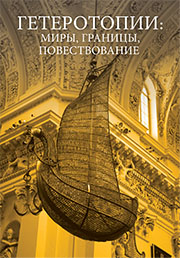О символической «гетеротопии» Фауста (На материале I части трагедии Гете)
On the Symbolic “Heterotopia” of Faust (On a Material of Part I of Goethe’s Tragedy)
Author(s): Alexander İvanitskiySubject(s): Human Geography, Studies of Literature, Semantics, Theory of Literature
Published by: Vilniaus Universiteto Leidykla
Summary/Abstract: The subject and sense of “Faust I” by J. W. Goethe is based on Faust’s travel between the semantically significant points that are the phases of his self-actualization. The meaning of these points was determined by the ideas of the literary cenacle “Storm and Rush”, that had been Goethe’s source of inspiration from the very beginning. Respectively, Faust, the German hero of the Modern Time, is seeking to completely perceive and conquer Nature. That’s why he vows to Mephistopheles, that in his endeavor to the Universal he would not noose himself forever with anything particular. Mephistopheles, the global spirit of negation and temptation, is sent to Faust by God. Mephistopheles tilts Faust’s craving for the knowledge of Nature towards the knowledge of national poetic depths. But on Earth the devil becomes the master of the German pagan world. In this Role he turns the Faust’s acknowledge of Nature to the deepening in this Nature as in the national inner and poetical ground. As a result the points attended by Faust under the directorship of Mephistopheles, becomes the phases of this deepening. First of all there are “Kitchen of the Witch” and Mountains of Harz, the place of the “Walpurgis-night”. They are tied with the “Street of the town”, “Garden”, and “Cave in the wood”. There are the places of the Faust’s love to Margaret, the main test of his pledge to Mephistopheles. The function of this point is determined by the paradoxical behaviour of the devil. Nominally he seeks to win his bet with Faust: to bring him to “stop the moment” and to stay forever with Margaret. But in deed he stimulates Faust to leave Margaret for the Walpurgis-night that is to bring to the conclusion his deepening in the national inner ground. By-turn, the witches’ Sabbath appears to Faust as a culmination of his sorrowful memory about Margaret, which he left and brought to ruin. As a result the points of the Faust’s deepening in the national ground (the literary program of “Storm and Rush”) appear as a dialectics of the inevitable victim and inevitable remorse.
Journal: Literatūra
- Issue Year: 57/2015
- Issue No: 5
- Page Range: 54-62
- Page Count: 9
- Language: Russian

